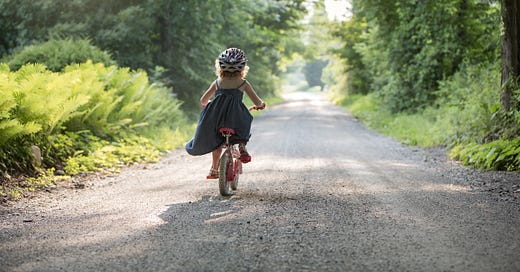Is Helicopter Parenting Ruining Kids?
We're more over-protective than we think — and yes, we're putting kids at risk.
Well hello there! For some reason I am not yet privy to (please share in the comments if you know!!) I got a bunch of new subscribers yesterday, and as of 10pm ET last night, there are now 20,000 of you!!! Welcome welcome welcome! As a quick introduction, I’m science journalist Melinda Wenner Moyer, and I bring science and nuance to parenting advice, challenge unfair and unrealistic child-rearing expectations, and highlight simple ways to raise resilient, awesome kids.
Two brief announcements: My next live Ask-Me-Anything thread is this Thursday, October 19, from 1 to 2pm ET. You can ask me about, yes, anything — parenting, my life, writing, teaching, cooking, whatever! If you can’t make it to the AMA but have a question, feel free to ask it here in this anonymous Google form. I’ll do my best to address it during the AMA, and you can check the thread afterwards.
Also, if you’re a paid subscriber, don’t forget to enter my October book giveaway, which includes Robyn Silverman’s How to Talk to Kids about Anything and Minna Dubin’s Mom Rage.
Yesterday, the C.S. Mott Children’s Hospital published the results of a new national poll. They wanted to gauge how parents felt about giving their kids independence and how much independence they actually allowed.
The results were astounding to me.
Let’s start with parents of younger kids. Although 74 percent of parents of kids aged 5 to 8 said in the survey that they “make it a point to have their child do things themselves when possible,” very few seem to actually let their child do things. For instance:
53 percent don’t regularly let their child talk with adults, such as doctors or nurses at health care visits
70 percent don’t let their child decide how to spend allowance or gift money
76 percent don’t let their child speak to unfamiliar adults in business situations, such as ordering at a restaurant
80 percent don’t let their child prepare their own meal or snack
Parents of kids aged 9 to 11 didn’t do much better. A whopping 84 percent of those parents said they agree that children benefit from unsupervised free time, and yet:
42 percent don’t let their child stay home alone for 30 to 60 minutes
50 percent don’t let their child find an item at the store while their parent is in another aisle
67 percent don’t let their child walk or bike to a friend’s house
71 percent don’t let their child play at the park with a friend
85 percent don’t let their child trick-or-treat with friends
Of course, of course, there are circumstances in which these activities could be unwise. Privilege is highly relevant, in that families who live in wealthier communities, which are often safer, understandably feel much more comfortable letting their child do things on their own. Race matters, too — consider that Black children are nearly six times as likely as white children to be killed with guns. And some kids may not be developmentally ready for certain activities. I certainly do not question parents for erring on the side of caution when caution is warranted.
Yet it’s clear that many parents err on the side of caution when perhaps they needn’t.




